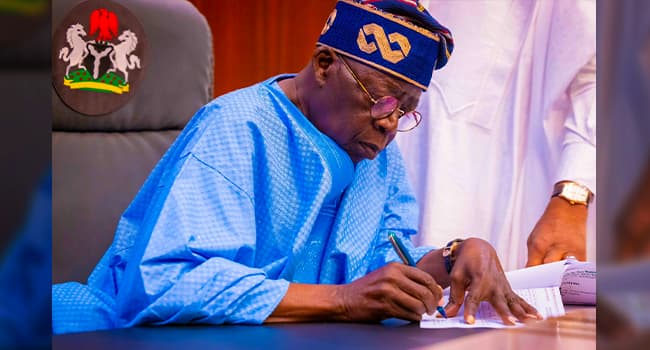Our Terms & Conditions | Our Privacy Policy
Tinubu Administration Borrows $6.45 Billion From World Bank In 16 Months
President Bola Ahmed Tinubu’s government has borrowed $6.4 billion from the World Bank in the last 16 months, according to a document released on the World Bank’s official website.
This borrowing is part of a broader trend, with the World Bank approving 36 loan requests worth $24.08 billion for Nigeria over the past five years. On September 26, 2024, the World Bank approved $1.57 billion in new financing aimed at bolstering Nigeria’s human capital through improved health services for women, children, and adolescents.
The funds will also support efforts to mitigate the impact of climate change, particularly in addressing floods and droughts through enhanced dam safety and irrigation.
The $1.57 billion funding includes:
$500 million for the Governance (HOPE-GOV) program, designed to tackle governance issues hindering education and healthcare delivery.
$570 million for the Primary Healthcare Strengthening Program (HOPE-PHC), which aims to improve the accessibility and quality of primary healthcare services.
$500 million for the Sustainable Power and Irrigation for Nigeria Project (SPIN), intended to enhance dam safety, improve water management, and boost agricultural productivity.
The World Bank highlighted the importance of these investments in improving the quality of education and healthcare, as well as safeguarding communities from climate-related disasters.
The SPIN project, in particular, will help protect up to 950,000 people, including farmers and livestock breeders, by providing more reliable irrigation and water supply services. It also aims to enhance agricultural productivity across 40,000 hectares of land through better water management.
The World Bank’s Country Director for Nigeria, Ndiamé Diop, emphasised the significance of these investments.
He noted that improving healthcare, education, and governance today will increase future employment opportunities, productivity, and earnings for Nigerians, particularly women and girls, while reducing poverty for the country’s most vulnerable populations.
According to the World Bank’s report, Nigeria has been a consistent borrower from the institution. In 2020, the World Bank approved 15 loan requests worth $6.36 billion, including projects for rural access, agricultural marketing, and COVID-19 response. In 2021, the country received $3.2 billion for six projects, while 2022 saw $1.26 billion approved for various programs, including livestock productivity and business environment reforms.
In 2023, the bank extended $2.7 billion to Nigeria with major allocations such as $750 million for power sector recovery and $750 million for renewable energy expansion. So far in 2024, $3.82 billion has been approved for five projects, including a $70 million grant.
By Ibe Wada
Images are for reference only.Images and contents gathered automatic from google or 3rd party sources.All rights on the images and contents are with their legal original owners.



Comments are closed.